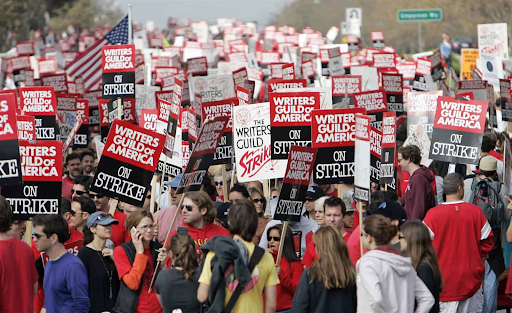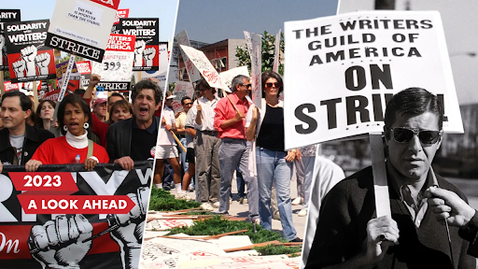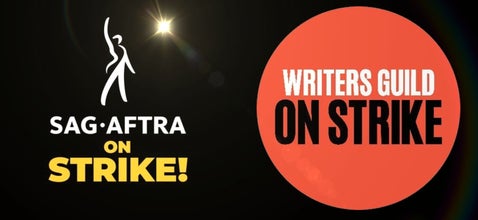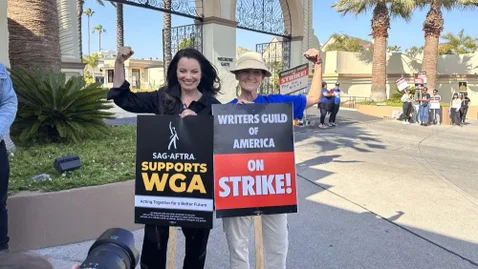By Alexis Gerstenkorn
Written in November of 2023

Members of WGA on the picket line
When people picture a life in Hollywood they often picture lavish parties and glamorous red carpets that were characterized in Hollywood's early golden years. A place where all it takes is one hit to rocket you into stardom and set you up for life. However, today's Hollywood reality is anything but glamorous.
On May 1st of 2023, the contract between the writers Guild of America (WGA) and major studios came to an end. As the new contract was being negotiated, many writers recognized the need for new and improved terms to fit the changing times. Things like the use of AI in the writing room as well as the issues of increasing the minimum wage and residuals that writers receive every time a show/movie is run. After a long series of failed negotiations, members of the Writers Guild made the unanimous decision to go on strike. Thousands of writers walked out forcing production to grind to a halt. Studios were then met with an even bigger issue. Shortly after the writers strike began, many actors whose contracts had also expired without resolution, made the decision to go on strike for similar reasons. Major projects were put on hold and even shut down completely and studios were left in chaos.
The writers strike lasted approximately 148 days and finally ended on September 26th as members of SAG-AFTRA and major studio executives finally came to an agreement and drafted up a new contract agreeing to the demands of the strikers. As of now, the actors' strike is still ongoing.
As we look back on these strikes, many ask “was this really necessary?” There is no doubt that these strikes have had a clear negative effect on big studio shows and movies and by extension us, the viewers. Although losing our favorite late night shows and seeing big movies we were excited about getting postponed is very disappointing, I still firmly say that yes, these strikes were/are very much necessary. Throughout the entertainment industry's history, there have been dozens of strikes and protests and each one has managed to bring about significant positive changes to the industry.

Members of the Writers guild of America on strike throughout the years.

Take 1!
For the purposes of this article I have mainly focused my research on other writers strikes that have occurred within the past few decades. But first to clarify..
You have probably seen a lot of coverage on the strikes involving the SAG-AFTRA organization and the actors strikes that are also going on. While SAG-AFTRA has shown tremendous support for the writers strike, they do not represent the writers. SAG-AFTRA is an organization that represents actors in the industry. The writers protest under the Writers Guild of America (WGA) which is a separate organization than that of SAG-AFTRA.
The Writers Guild of America, was founded in the 1920s as a “fraternity to protect and promote the interests of its members.” Since their inception, the writers guild has grown exponentially and has fought to secure writers the proper recognition and compensation that they deserve within the industry as well as help to improve the relationship between writers and producers by opening the lines of communication and bridging the gap between the two.
STRIKE!
The WGA has been a major influence within the film industry and has helped to pave the way for writers everywhere however, though they have made great strides throughout their impressive history they have only had a total of eight major strikes in over a century of existence. Their earliest strike occurred in 1952 over issues of minimum wage, script ownership, and allowing radio and theater writers to submit scrips for TV productions, the strike lasted approximately 14 weeks and ended with studios and the WGA agreeing to a new deal .

SAG-AFTRA president Fran Drescher joining WGA picket line in solidarity
Prior to the most recent strike in 2023, the longest strike in WGA history occurred in 1988 when writers walked out over disagreements over residual payments for films and shows broadcasting in foreign countries. This strike lasted approximately 22 weeks and ended with a new contract that updated the formulas for calculating residuals and increases in the minimum wage.
As the time went on and technology began to advance, with the introduction of video cassettes, pay-per-view, internet, and now streaming services the issue of pay and residuals remains a major sticking point that continues to come up in each strike.
With each strike, studios and writers were able to develop better and more detailed contracts that were able to keep up with the changing times and newer technology.
During the most recent strike in May of this year, some of the biggest issues that writers faced was the refusal of studios to increase the minimum wage and the amount of residuals, which is an ongoing compensation or payment that writers and actors receive after a projects release. Additionally with the introduction of AI writers worried that AI writing programs would be fed their work and eventually be used to replace them once they consumed enough material to begin writing coherent scripts.
The strike lasted 148 days and featured many failed sit downs between studio and WGA representatives. As public support for strikers and outrage against studios began to grow, studios felt the pressure rising.
Finally in mid-September, studios finally proposed a new deal agreeing to many of the major demands of protesters. According to CNN insiders within the studio organizations “As part of the deal, most writers’ minimum pay will increase 5% immediately, another 4% in May 2024 and then another 3.5% in May 2025” And additionally “ Initial compensation and residual pay for big-budget streaming projects will increase as part of the new contract.” Studios also included a clause in the new contract that AI cannot be used to write or rewrite any material and any material written by AI must be disclosed to writers. In the end nearly all major demands were met by studios and writers were able to return to work.
What About Us?
Now many argue that the risks writers take going on strike does not equal the reward of a new contract and I can see how many would think this to be true in a sense. Strikes, especially those that last for long periods of time, can cost studios millions with this most recent strike costing the state of California, where many major studios reside and which relies heavily on the income they bring in, nearly 3 billion dollars as stated by professor Todd Holms of the university of California. In addition it also causes issues for viewers as they watch their favorite shows come off the air and big film projects being postponed.
And while yes this does seem like a downside, I encourage you to take a step back and look at this issue from the point of view of the writers. First, you may not know, but when negotiations for the new contract were still in its early stages it was estimated by WGA representatives that in order for studios to meet the pay increases that writers were demanding it would cost each studio approximately 30 to 40 million dollars , and while this may seem like a massive sum of money, it is only about 1-2% of a studios total earnings in a year. In the face of a 8 billion dollar loss it seems like studios dug themselves into a much deeper hole. As for the inconvenience to us the viewers, I want to remind you of what it is exactly that many of these writers are fighting for.
One of the major issues of the strike was the increase in the minimum wage. On average, before the strike, nearly half of all writers worked for minimum wage, often having to pick up second jobs to be able to support themselves and their families. Even those writing for major films and hit tv shows were poorly compensated for their work and paid literal pennies in terms of residual payments. So yes, while it may have been inconvenient for you to be missing out on your favorite late night shows, it is even more inconvenient for the writers of that show to be missing out on their rent for the month.
To us watching thousands of writers walking out of their jobs may seem like an “overreaction” but there comes a point where negotiations simply won’t go any further and the pleas of writers fall on deaf ears. At that point, it seems like taking action is the only way to go, and looking at the success of previous strikes it seems to be one of the only options that bring about real long lasting change.
Sources
-librarian, Scott WilsonTimes research. “A History of Hollywood Writers’ Strikes.” Los Angeles Times, 4 May 2023, www.latimes.com/entertainment-arts/business/story/2023-05-04/writers-strike
-hollywood-history-wga-labor.
-Swett, Hilary. “SWG History.” The Writers Guild Foundation, 2020, www.wgfoundation.org/screenwritersguild-history.
- Zornosa, Laura. “Why Actors Are Going on Strike.” Time, 12 July 2023, time.com/6294212/sag-aftra-actors-strike/.
-Alexander, Reed. “Why Hollywood Actors and Writers Are on Strike and How the WGA and SAG-AFTRA Walkouts Are Changing the Entertainment Industry.” Business Insider, www.businessinsider.com/why-sag-aftra-actors-wga-writers-unions-strike-hollywood.
-Delouya, Taylor Romine,Samantha. “Writers Union Ratifies Its New Contract with Hollywood and TV Studios | CNN Business.” CNN, 9 Oct. 2023, www.cnn.com/2023/10/09/media/wga-contract-ratified/index.html.
-IV, Antonio Pequeño. “Hollywood Writers’ Strike: Here’s a Timeline of What Led to the 100-Day Mark.” Forbes, www.forbes.com/sites/antoniopequenoiv/2023/08/09/hollywood-writers-strike-heres-a-timeline-of-what-led-to-the-100-day-mark/?sh=a4b2aa97ad39. Accessed 8 Nov. 2023.
-Kilkenny, Katie. “Writers Guild Posts Studio-By-Studio Forecast of How Much a Deal Would Cost.” The Hollywood Reporter, 16 May 2023, www.hollywoodreporter.com/business/business-news/wga-strike-union-estimates-how-much-deal-would-cost-1235493055/.